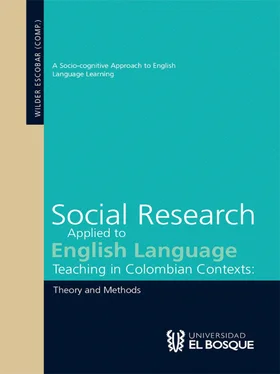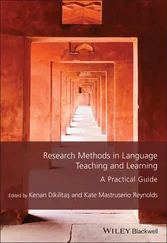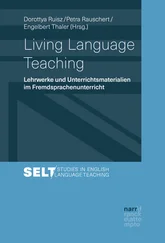Cognitive Linguistics and the Teaching of Phrasal Verbs
Implications for Future Research
Conclusion
CHAPTER TWO
SOCIAL DYNAMICS SHAPING ENGLISH LEARNING PROCESSES
About the Authors
Introduction
Literature Review
Research Design
Data Analysis and Findings
Conclusions
CHAPTER THREE
EFFECTS OF EMOTIONAL BARRIERS AND DISEMPOWERMENT ON LEARNING AND COMMUNICATIVE PROCESSES PRESENT IN EFL STUDENTS
About the Author
Introduction
Description of the Problem
Literature Review
Background Research on Empowerment in Colombia
Methodology
Pedagogical Implications
Conclusion
CHAPTER FOUR
LITERACY PRACTICES AND LANGUAGE ISSUES IN COLOMBIAN EFL CONTEXTS
About the Authors
Introduction
Literature Review
Research Method
Data Analysis and Findings
Conclusions
CHAPTER FIVE
CHILDREN’S NARRATIVES: A MIRROR OF THEIR SOCIAL SENSITIVITY
About the Autor
Introduction
Literature Review
Research Design
Instruments
Instructional Design
Data Analysis and Findings
Conclusions and Pedagogical Implications
Further Research
REFERENCES
Introduction A Socio-cognitive Approach to English Language Learning
Wilder Yesid Escobar Alméciga was born in Cundinamarca, Colombia and holds a B. A. in business administration from Simpson University, California and a master’s degree in applied linguistics to TEFL from Universidad Distrital Francisco José de Caldas, Bogotá. His work experience includes teaching at all levels from elementary school, to postgraduate courses in both the United States of America and in Colombia. He is currently working as an assistant professor for the undergraduate Bilingual Education Program at Universidad El Bosque leading the research processes on Bilingual Education. His research publications address social issues through discourse analysis in English as a foreign language teaching and learning. For the last two years, he has been a member of the research group Educación Universitaria Unbosque.
A Socio-cognitive Approach to English Language Learning
Language Learning is a Social Practice
Traditionally, the teaching of English as a Foreign Language (EFL) has been erroneously associated with mechanical procedures and misunderstood as a standardized practice which is homogeneously exercised in the language classroom (Ayala & Álvarez, 2005; Escobar & Gómez, 2010; Guerrero, 2008). However, Parodi (2005) demonstrates that language is always transforming and being transformed by social environments, drawing significant correlations between linguistic systems and social dynamics. In the same way, this work attempts to present social research projects applied to English language teaching practices, and highlight their contribution to the understanding of English learning as a social process which must be informed by its immediate and diverse social contexts.
On the one hand, Sapir (1970) makes a remarkable contribution to the conceptualization of language as a nonstandard, ever-evolving social phenomenon in which he moves from systemic explanations to cultural and identity-related descriptions of its characteristics. Initially, he introduces language as a system characterized by a structural organization that carries autonomous meaning. The fact that its written form has a predetermined fundamental direction from left to right and from top to bottom gives priority to its components, words, and concepts which follow a preestablished order. Furthermore, Sapir suggests that such preestablished order is culturally bound, i.e. that not all societies have identical language organization. In direct opposition to English writing, Hebrew, for example, organizes ideas from right to left and from top to bottom. In the same way, traditional Japanese text is written in columns from top to bottom and from right to left with its first pages opposite of that which characterizes our writing system. To demonstrate the structural differences which characterize language, chapter one presents a theory-based analysis of the verb patterns of English and Spanish, specifically addressing motion event conflation in verb- and satellite-framed languages. Finally, after examining the influence that individuals exert on language production, the author attests that the social context, indeed, merits further investigation to determine its role in language acquisition and use.
Similarly, Fairclough (2003) examines the adverse and asymmetrical social conditions, e.g. exclusion, power, dominance, and control, which can be generated through the use of language in social practices such as speaking and writing. Through his research, Fairclough seeks to promote a social awareness that may potentially result in significant changes of such conditions. Since social research is concerned with “watching […] people live their lives, asking people about their experiences, and using words to tell others’ stories” (Tisdale, 2004, p. 13), chapters two and three of this text rely on social research to similarly explore the lives of students and understand their realities, raise awareness, and motivate change in the rigid social structures which disrupt knowledge constructions, marginalize individuals, and perpetuate unbalanced relations of power. To elaborate upon this concept, chapter two presents an ethnographic case study designed to unveil interactional dynamics among students from a class composed of 29 main-stream and six special-education students under the inclusion act in education. Subsequently, the case study discussed in chapter three seeks to analyze specific power relationships among teenagers, and proposes an effective approach to teaching based on emotional empowerment.
Essentially, there are two general misconceptions about knowledge. First, it is often perceived as a static rather than a dynamic entity. However, knowledge evolves through a dynamic social process, changing and being changed by individuals, groups, and contexts. Thus, knowledge presents new opportunities and challenges which require not only to be recognized, but to be comprehended, so as to be able to react and cope with the speed of such change (Gale, 1996). Having a static vision of knowledge could translate into implementing standardized teaching procedures which ignore contextual information. As a result, these teaching procedures may fail to identify our own shortcomings and strengths, thereby limiting our capacity for intellectual growth.
The second misconception of knowledge is that its components often exist in isolation rather than as an interdependent and systemic network of functional constituents. Learning which focuses on isolated facts learned out of context disregards the complex interaction between learner and knowledge. In this way, consideration for the learner’s self-conception is often overlooked and, as such, may hinder learning. To directly address this misconception, chapter three is devoted to developing a clear association between the emotional self and the learning process describing the emotional factors that could potentially limit student learning and performance in a foreign language. Undoubtedly, facts in and of themselves prove inadequate unless they are taught in consideration of the emotional and cognitive realities of the students.
Moreover, Skutnabb-Kangas and McCarty (2008) suggest that language is closely and directly linked to identity. They illustrate it as the sharing of historical, cultural, and socio-linguistic backgrounds that bind individuals or groups together. Such backgrounds concurrently embody the differences that allow us to be dissimilar to other individuals or groups. For example, the similarities that Mexicans share among themselves and which tie them together as a socio-political community are also the aspects that set them apart from other cultures. Individual, as well as social identities are constructed and expressed in many different ways: religion, nationality, ethnicity, gender, language, dialects and accents (Block, 2007; Bucholtz & Hall, 2004; Foucault, 1988; Lister, 2006). As such, chapter four presents an ethnographic analysis of English language teaching practices in light of the learners’ socio-cultural backgrounds and contexts in order to modify a foreign-language teaching model which considers the social and learning needs of the students.
Читать дальше












